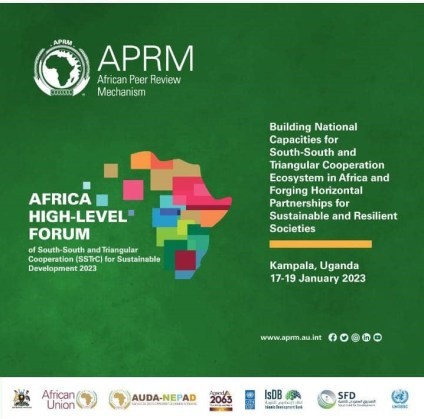
The Government of Uganda in partnership with the African Peer Review Mechanism (APRM) from 17th to 19th January 2023, hosted the Second High-Level Forum on South-to-South Triangular Cooperation (SSTrC) under the theme: Building national capacities for South-South and Triangular-Cooperation ecosystems in Africa and forging horizontal partnerships for sustainable and resilient societies.
H.E Yoweri Kaguta Museveni, President of the Republic of Uganda will gave a keynote address during the Forum.
The Conference brought together political leaders and heads of corporations and institutions from key private partners and public institutions which was a demonstration of the commitment to accelerate SSTrC implementation. The Buenos Aires Plan of Action (BAPA) for Promoting and Implementing Technical Cooperation among Developing Countries endorsed by the General Assembly in 1978 (resolution 33/134) sets out the modalities for the implementation of the cooperation.
The efforts to promote SSTrC in Africa and beyond were affected by the COVID-19 pandemic. As a continent, we registered unprecedented disruptions in various processes with a direct bearing on both planning and implementation of socio-economic development policies. Combating COVID-19 and addressing both existing and new challenges, strengthening South-South cooperation and solidarity can offer a positive route forward for the developing countries.
In particular, addressing these challenges calls for new financial relations/arrangements, rebuilding trade competitiveness by reviving industrial growth and strengthening south-south cooperation in areas such as health and multilateral trade agreements. Thus both financial and non-financial forms of South-South and triangular cooperation continue to evolve to meet current and future challenges. On the other hand, these countries have accumulated effective development practices and others have demonstrated strong achievements in various domains, which are of great use to support other countries’ development efforts. Further, there are still impediments to greater SSTrC due to weak national eco-system for South-South Cooperation. Therefore, it has affected progress towards increased South-South trade, South-South flows of Foreign Direct Investment (FDI), movements towards regional integration, technology transfers, sharing of solutions and experts, and other forms of exchanges.
The solidarity of African Countries under the SSTrC is an important catalyst to achieve national and collective self-reliance, which is fundamental for Africa’s socio-economic prosperity and transformation, therefore, imperative to strengthen SSTrC.
South-South and Triangular Cooperation (SSTrC) remains an important framework to bolster the capacities of developing countries towards the attainment of the national, regional and international development aspirations. Over the last two decades, SSTrC has been recognized as an innovative paradigm in development cooperation among nations that enriches notions of solidarity, mutual respect, and technical support between developing nations and Low Developed Countries. The South-South and Triangular Cooperation therefore has been recognized with immense potential to benefit countries to accelerate their achievements in the attainment of all national development goals, Africa Agenda 2063, the Sustainable Development Goals (SDGs) and integration amongst countries of the global south.

